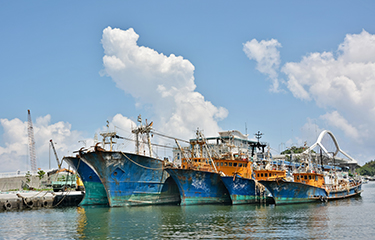The U.S. Department of Labor (DOL) has released its 2020 “List of Goods Produced by Child Labor or Forced Labor,” and has included Taiwan for the first time for its issues related to forced labor in the fishing industry.
The inclusion comes after 19 NGOs and businesses urged the DOL to include the nation on its list after discoveries of forced labor on fishing vessels in Southeast Asia. A damning Greenpeace report accused 13 foreign distant-water fishing vessels of using forced labor.
Greenpeace applauded the DOL’s decision to include Taiwan on the list, which is considered an authoritative source on the state of forced labor and is a key resource in sourcing decisions by U.S. companies.
“The yellow card from the E.U. in 2015 prompted Taiwan to make changes to its fisheries regulation. However, despite the strong and widely recognized relationship between illegal fishing and forced labor, Taiwan had largely overlooked the rights of migrant fishers as it reformed its fisheries policies,” Greenpeace East Asia Ocean Campaigner Pearl Chen said in a release.
That lack of oversight, Chen said, is part of why laborers on board Taiwanese vessels still often face labor and human rights abuses, and more needs to be done.
“Migrant fishers are still discriminated against by the two-tiered recruitment system and remain at risk of abuse and forced labor on board Taiwanese fishing vessels,” Chen said. “In addition to the government, FCF, a Taiwan-based seafood company and one of the world’s top three tuna traders, should take more responsibility for forced labor risks in its supply chain and be a leader by revamping its business so it fosters an ethical seafood industry that effectively prevents forced labor.”
The report acknowledged that Taiwan’s fleet – the second largest in the world – has repeated instances of crews facing difficulties related to forced labor.
“Similar to crews on Chinese-flagged vessels, crews on Taiwan-flagged vessels face confiscation of documents, long days with little rest, physical and verbal abuse, and lack of payment,” the report stated.
The report recounts the story of Irwan, and Indonesian man who signed a contract to become a fisher with a recruitment agency in his hometown. Subsequently, he didn’t receive a copy of his contract, and boarded a Taiwan-flagged vessel in Dakar, Senegal. After being promised a monthly salary of USD 450 (EUR 382), he had multiple fees deducted from his pay that he was uninformed about. After fees, he was receiving just USD 50 (EUR 42.50) a month.
On board, the captain of the vessel confiscated the crew’s passports and forced workers to fish for 16 to 18 hours a day, with an average of just 2 to 3 hours sleep. If no fish were caught, they were forced to work up to 34 hours straight.
“Irwan had no days off, no health insurance, and no protection from violence aboard the ship,” the DOL report states. “He experienced beatings from his captain, and at times, from fellow crew members who were ordered to do so by the captain. Irwan also witnessed the deaths of fellow migrant fishers from abusive working conditions, their bodies wrapped up and stored in the freezer or thrown into the sea. In the vast distant waters, workers are isolated and there is very little oversight. At sea, it is difficult and often impossible for fishers to escape these conditions.”
Seafood is a major perpetrator of both forced and child labor in a number of countries. By the DOL’s reckoning, at least 11 countries utilize child labor in the fishing industry, while 4 countries utilize forced labor.
Countries using child labor in the seafood industry include Brazil, Cambodia, El Salvador, Kenya, Nicaragua, Paraguay, Peru, Philippines, Tanzania, Uganda, Vietnam, and Yemen. Countries using forced labor include China, Taiwan, and Thailand; and countries using a combination of both forced and child labor include Bangladesh, Ghana, and Indonesia.
“While today’s announcement is a significant milestone in the global fight against forced labor and illegal fishing, much more remains to be done to eradicate these twin scourges from our planet,” Greenpeace USA Senior Oceans Adviser Andy Shen said. “Greenpeace calls on DOL to remain principled in their engagement with the Taiwanese government. Structural, not superficial, reforms are needed to fundamentally change the system designed to exploit people and our ocean.”
Photo courtesy of elwynn/Shutterstock







